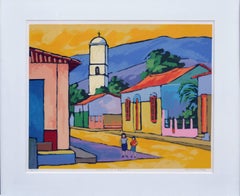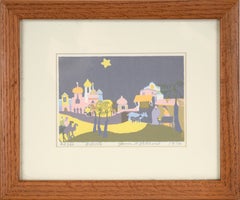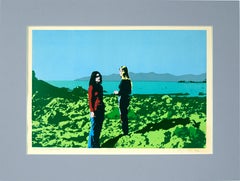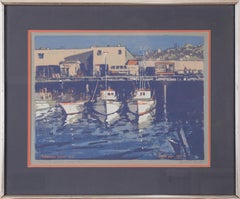Want more images or videos?
Request additional images or videos from the seller
1 of 10
Pegge Hopper Hawaiian Woman At The Beach 1978 Signed and Dated Serigraph1978
1978
Price:$680
$850List Price
About the Item
- Creator:Pegge Hopper (1936)
- Creation Year:1978
- Dimensions:Height: 33 in (83.82 cm)Width: 36 in (91.44 cm)Depth: 1.5 in (3.81 cm)
- Medium:
- Movement & Style:
- Period:
- Condition:Paper has foxing spots throughout. Presented in a mat and wooden frame under plexi-glass.
- Gallery Location:Soquel, CA
- Reference Number:Seller: N88201stDibs: LU54213205892
About the Seller
5.0
Platinum Seller
Premium sellers with a 4.7+ rating and 24-hour response times
Established in 1986
1stDibs seller since 2014
3,039 sales on 1stDibs
Authenticity Guarantee
In the unlikely event there’s an issue with an item’s authenticity, contact us within 1 year for a full refund. DetailsMoney-Back Guarantee
If your item is not as described, is damaged in transit, or does not arrive, contact us within 7 days for a full refund. Details24-Hour Cancellation
You have a 24-hour grace period in which to reconsider your purchase, with no questions asked.Vetted Professional Sellers
Our world-class sellers must adhere to strict standards for service and quality, maintaining the integrity of our listings.Price-Match Guarantee
If you find that a seller listed the same item for a lower price elsewhere, we’ll match it.Trusted Global Delivery
Our best-in-class carrier network provides specialized shipping options worldwide, including custom delivery.You May Also Like
Original Continental Airlines limited edition Serigraph vintage travel poster
Located in Spokane, WA
Original Continental Airlines travel poster. Linen backed in fine condition. Signed and numbered 35/50.
This original Continental Airlines poster is an artistic representation of regional destinations prominently served by Continental Airlines in the past. The design is modern and bold, showcasing a unique black-and-white theme with strong, futuristic typography and graphical illustrations. Each city is creatively depicted using stylized imagery that resonates with its character—Oklahoma City features a cowboy motif, New Orleans embraces a jazzy, cultural essence, Dallas reflects the energy of movement, and Midland/Odessa highlights industrial and oil-centric themes.
This limited-edition poster is printed in black and white. It features the destinations of Hawaii, San Francisco, Albuquerque and Portland Above each name is a design that represents each destination city.
Hawaii has rows of palm trees and hula dancers. San Francisco has rolling hills and cable cars. Albuquerque has tribal Indians dancing. Portland has the cruise shipping. This image features the Saul Bass l967 Continental logo in the design.
Continental Airlines was a major United States airline founded in 1934 and eventually headquartered in Houston, Texas.
The airline was acquired by UAL Corporation, the parent company of United Airlines, on October 1, 2010.
This is an original vintage Continental Airlines poster...
Category
Late 20th Century American Modern Figurative Prints
Materials
Screen
$675
H 40 in W 26.5 in D 0.3 in
Original British Columbia United Air Lines travel poster
Located in Spokane, WA
Behold the original British Columbia United Air Lines vintage Travel Poster—a rare gem from the mid-century Modern era. This archival linen-backed beauty is in excellent condition an...
Category
1960s American Modern Figurative Prints
Materials
Screen
Original Continental Airlines limited edition travel poster
Located in Spokane, WA
Original Continental Airlines travel poster. Linen backed in fine condition. Signed and numbered 35/50.
This original Continental Airlines poster artistically represents regional destinations prominently served by Continental Airlines in the past. The design is modern and bold, showcasing a unique black-and-white theme with strong, futuristic typography and graphical illustrations. Each city is creatively depicted using stylized imagery that resonates with its character—Oklahoma City features a cowboy motif, New Orleans embraces a jazzy, cultural essence, Dallas reflects the energy of movement, and Midland/Odessa highlights industrial and oil-centric themes.
This limited-edition poster is printed in black and white. It features Oklahoma City, New Orleans, Dallas, and Midland / Odessa destinations. Above each name is a design that represents each destination city.
Oklahoma City has rodeo horseback riding. New Orleans has steamships, Dallas has football players, and Midland has large oil tanker trucks. This image features the Saul Bass l967 Continental logo in the design.
Continental Airlines was a major United States airline founded in 1934 and eventually headquartered in Houston, Texas.
The airline was acquired by UAL Corporation, the parent company of United Airlines, on October 1, 2010.
This is an original vintage Continental Airlines poster...
Category
Late 20th Century American Modern Landscape Prints
Materials
Screen
$675
H 40 in W 265 in D 0.2 in
Original "Japan" vintage travel poster serigraph bicycle
Located in Spokane, WA
Original Japan serigraph travel poster. Linen backed in very find condition, ready to frame.
Japanese travel posters have a rich history and are renowned for their captivating aesthetics, often blending traditional imagery with modern elements. In the 1970s, during the height of travel poster popularity, Japanese artists created numerous designs promoting tourism within the country and to international destinations. The poster you're referring to, produced by the American Screen Printing Co. in 1972, likely aimed to capture the essence of Japanese culture and scenery while appealing to an American audience.
Pagodas are iconic structures in Japanese architecture. They are multi-tiered towers...
Category
1970s Modern Landscape Prints
Materials
Screen
$420 Sale Price
20% Off
H 35 in W 23.5 in D 0.05 in
Original "Wagon Lits" pop art style serigraph travel by train poster
By Valerio Adami
Located in Spokane, WA
Original “Wagon Lits” serigraph poster by the artist Valerio Adami.
It was printed in France by GrafiCaza (Michel Caza), one of the finest serigraph companies on woven paper—in exce...
Category
1990s American Modern Figurative Prints
Materials
Screen
$260 Sale Price
20% Off
H 36 in W 24 in D 0.05 in
Stewart Wheeler, Atlantic City (New Jersey)
Located in New York, NY
The little that is know about the painter and printmaker Stewart Wheeler indicates that most of his career was spent in Philadelphia, Pennsylvania. And...
Category
Mid-20th Century American Modern Landscape Prints
Materials
Screen
Sea View - Screen Print - 1990s
Located in Roma, IT
Sea View is an original Screen Print, realized by an anonymous artist in the 1990s.
The status of preservation Good.
The artwork is depicted skillfully thro...
Category
1990s Modern Figurative Prints
Materials
Screen
Harry Shokler, Island Harbor
By Harry Shokler
Located in New York, NY
Harry Shokler used serigraphy to great advantage in this landscape. It's colorful and detailed.
It is signed in the image at the lower left. When printmakers began making serigraphs...
Category
1940s American Modern Figurative Prints
Materials
Screen
Modernist Silkscreen Screenprint 'El Station, Interior' NYC Subway, WPA Artist
By Anthony Velonis
Located in Surfside, FL
screenprint printed in color ink on wove paper. New York City subway station interior.
Anthony Velonis (1911 – 1997) was an American painter and designer born in New York City who helped introduce the public to silkscreen printing in the early 20th century.
While employed under the federal Works Progress Administration, WPA during the Great Depression, Velonis brought the use of silkscreen printing as a fine art form, referred to as the "serigraph," into the mainstream. By his own request, he was not publicly credited for coining the term.
He experimented and mastered techniques to print on a wide variety of materials, such as glass, plastics, and metal, thereby expanding the field. In the mid to late 20th century, the silkscreen technique became popular among other artists such as Robert Rauschenberg and Andy Warhol.
Velonis was born into a relatively poor background of a Greek immigrant family and grew up in the tenements of New York City. Early on, he took creative inspiration from figures in his life such as his grandfather, an immigrant from the mountains in Greece, who was "an ecclesiastical painter, on Byzantine style." Velonis attended James Monroe High School in The Bronx, where he took on minor artistic roles such as the illustration of his high school yearbook. He eventually received a scholarship to the NYU College of Fine Arts, into which he was both surprised and ecstatic to have been admitted. Around this time he took to painting, watercolor, and sculpture, as well as various other art forms, hoping to find a niche that fit. He attended NYU until 1929, when the Great Depression started in the United States after the stock market crash.
Around the year 1932, Velonis became interested in silk screen, together with fellow artist Fritz Brosius, and decided to investigate the practice. Working in his brother's sign shop, Velonis was able to master the silkscreen process. He reminisced in an interview three decades later that doing so was "plenty of fun," and that a lot of technology can be discovered through hard work, more so if it is worked on "little by little."
Velonis was hired by Mayor LaGuardia in 1934 to promote the work of New York's city government via posters publicizing city projects. One such project required him to go on a commercial fishing trip to locations including New Bedford and Nantucket for a fortnight, where he primarily took photographs and notes, and made sketches. Afterward, for a period of roughly six months, he was occupied with creating paintings from these records. During this trip, Velonis developed true respect and affinity for the fishermen with whom he traveled, "the relatively uneducated person," in his words.
Following this, Velonis began work with the Public Works of Art Project (PWAP), an offshoot of the Civil Works Administration (CWA), where he was assigned to serve the different city departments of New York. After the formation of the federal Works Progress Administration, which hired artists and sponsored projects in the arts, he also worked in theater.
Velonis began working for the federal WPA in 1935. He kept this position until 1936 or 1938, at which point he began working in the graphic art division of the Federal Art Project, which he ultimately led. Under various elements of the WPA program, many young artists, writers and actors gained employment that helped them survive during the Depression, as well as contributing works that created an artistic legacy for the country.
When interviewed in December 1994 by the Library of Congress about his time in the WPA, Velonis reflected that he had greatly enjoyed that period, saying that he liked the "excitement" and "meeting all the other artists with different points of view." He also said in a later interview that "the contact and the dialogue with all those artists and the work that took place was just invaluable." Among the young artists he hired was Edmond Casarella, who later developed an innovative technique using layered cardboard for woodcuts.
Velonis introduced silkscreen printing to the Poster Division of the WPA. As he recalled in a 1965 interview: "I suggested that the Poster division would be a lot more productive and useful if they had an auxiliary screen printing project that worked along with them. And apparently this was very favorably received..."
As a member of the Federal Art Project, a subdivision of the WPA, Velonis later approached the Public Use of Arts Committee (PUAC) for help in "propagandizing for art in the parks, in the subways, et cetera." Since the Federal Art Project could not be "self-promoting," an outside organization was required to advertise their art more extensively. During his employment with the Federal Art Project, Velonis created nine silkscreen posters for the federal government.
Around 1937-1939 Velonis wrote a pamphlet titled "Technical Problems of the Artist: Technique of the Silkscreen Process," which was distributed to art centers run by the WPA around the country. It was considered very influential in encouraging artists to try this relatively inexpensive technique and stimulated printmaking across the country.
In 1939, Velonis founded the Creative Printmakers Group, along with three others, including Hyman Warsager. They printed both their own works and those of other artists in their facility. This was considered the most important silkscreen shop of the period.
The next year, Velonis founded the National Serigraph Society. It started out with relatively small commercial projects, such as "rather fancy" Christmas cards that were sold to many of the upscale Fifth Avenue shops...
Category
1980s American Modern Figurative Prints
Materials
Screen
DISCOVERY OF GOLD - Very Large Serigraph - WPA Artist - California Murals
By Anton Refregier
Located in Santa Monica, CA
ANTON REFREGIER (1905 – 1979)
DISCOVERY OF GOLD, 1949. Color serigraph. Signed and numbered in pencil, edition of 90. Image 23 ¼ x 21 ¾" Large sheet, 29 3/4 x 25 ¼”. Printed title...
Category
1940s American Modern Figurative Prints
Materials
Screen
$1,250
H 23.5 in W 21.75 in
More From This Seller
View AllCalle De La Ermita, Valencia Spain
By Guido Lopez
Located in Soquel, CA
Bright and bold screen print by Spanish artist Guido Lopez (Spain, 20th century). Signed and titled, "Guido Lopez", 12/150. Unframed. Image 22.5"H x 25"L, Mat 31"H x 34.25"L.
Category
Early 2000s Modern Figurative Prints
Materials
Screen
"Nativity" Modernist Landscape Screen Print in Ink on Paper -
Located in Soquel, CA
"Nativity" Modernist Landscape Screenprint in Ink on Paper
Whimsical modern landscape silkscreen print of the nativity scene by San Francisco, C...
Category
1970s Modern Figurative Prints
Materials
Paper, Printer's Ink, Screen
$452 Sale Price
20% Off
"2 Lovely Strangers" - Pop Art Multi-layer Screenprint
Located in Soquel, CA
"2 Lovely Strangers" - Pop Art Multi-layer Screenprint
Highly saturated multi-layer screenprint by Steve J. Pon (20th Century). Two figures stand in the middle of a coastal landscap...
Category
1970s Pop Art Landscape Prints
Materials
Paper, Ink, Screen
"Fisherman's Wharf - San Francisco" Multi Layer Screen Print on Paper - Signed
By Gordon Cope
Located in Soquel, CA
"Fisherman's Wharf - San Francisco" Multi Layer Screen Print on Paper - Signed
Rare and bold Screen Print (Silk Screen) of Fisherman's Wharf 1957 by Gordon Cope (American, 1906-1999). Several boats are docked at Fisherman's Wharf, with buildings directly behind them. In the distance, the hills of San Francisco can be seen meeting a pale blue sky. Of particular note is the skillful representation of the reflections of the boats in the water, and the clever use of grey paper as negative space.
Numbered and titled in pencil in the lower left corner "22/100 Fisherman's Wharf - San Francisco"
Hand signed and dated in pencil in the lower right corner "Gordon Cope 1957"
Titled, signed, and dated "in plate"
Presented in a silver colored frame with a double mat.
Frame size: 22.5"H x 27"W
Image size: 15"H x 20"W
Gordon N. Cope (American, 1906-1999) was an educator and painter. Trained in Utah and France, he exhibited his landscape paintings and portraits in the United States and Europe, and he believed music was related to painting.
Cope was born on May 14, 1906, in Salt Lake City. He was trained by Utahn artists LeConte Stewart and Lawrence Squires, and at the Académie Julian in Paris, France in 1928. He also studied singing at the Opéra-Comique.
Cope taught art at Latter-day Saints University, and he served as the chair of its Department of Art in 1930–1931. He taught at the Mountain School of Art from 1932 to 1938, and he was the director of the Art Barn School in Salt Lake City in 1939–1941. Cope painted Utahn landscapes as well as a portrait of Henry H. Blood, who served as the seventh governor of Utah from 1933 to 1941. Cope exhibited his work in the United States and Europe. According to the Deseret News, Cope "felt that music and painting are closely interrelated, and that the study of one form may be used to complement the appreciation and understanding of the other."
Cope died on June 10, 1999, in San Francisco, California.
Gordon Nicholson Cope studied with well-known Utah artists A.B. Wright and LeConte Stewart, and became recognized as a major Utah artist of the Great Depression. Cope was born in Salt Lake City in 1906 and spent much of his life in Utah.
Cope gained much of his artistic training from diverse environments and influences. Following his training with the previously mentioned artists, Cope spent the next year, 1924, working with Lawrence Squires in Arizona. To expand his knowledge and training, Cope traveled to Europe, where he studied the "old masters" such as Da Vinci, Michelangelo, and Raphael. From 1924 to 1928, Cope studied in England, France, Italy, Switzerland, Belgium, Holland, and worked for a year at the Acadamie Julian, where many early Utah artists...
Category
1950s American Impressionist Landscape Prints
Materials
Paper, Ink, Screen
$1,320 Sale Price
20% Off
"Sharing" Multi Layer Screen Print on Paper
Located in Soquel, CA
Vibrant screen print of people gathering around a pond by Jane Leddy (American, 1925-2019). People and various animals - including goats, ducks, and cows - ...
Category
1980s American Impressionist Figurative Prints
Materials
Paper, Ink, Screen
Dreamscape - Figural Abstract
By Mohammad Hourian
Located in Soquel, CA
Dreamy abstract figural landscape of a metallic gold sun hung low in a purple sky with peace doves over a bright blue ocean and sailboat. In the foreground a reclining female figure ...
Category
1990s Modern Figurative Prints
Materials
Paper, Mixed Media, Watercolor, Giclée
$600 Sale Price
20% Off
Recently Viewed
View AllMore Ways To Browse
Vintage Hawaii Signs
Pegge Hopper Print
Pegge Hopper
Lithograph Yrjo Edelmann
Madeline Prints
Man In Bowler Hat
Marc Chagall 1975
Marc Chagall Daphnis
Marc Chagall Fleurs
Marc Chagall Hand Signed
Marc Chagall Paris Opera
Mario Sughi
Matisse Aquatint
Matisse Danseuse
Morandi Etching
Mr Brainwash Never Give Up
Murakami Korin
Norman Rockwell Freedom Of Speech



